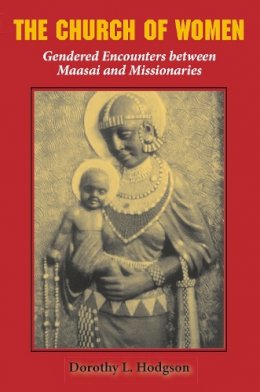
The Church of Women: Gendered Encounters between Maasai and Missionaries
Dorothy L. Hodgson
In Africa, why have so many more women converted to Christianity than men? What explains the appeal of Christianity to women? What does religious conversion mean for the negotiation of gender and ethnic identity? What role does religious conversion play as a tool for empowering women? In The Church of Women, Dorothy L. Hodgson looks at how gender has shaped the encounter between missionary priests and Maasai men and women in Tanzania. Building on her extensive experience with Maasai and the Spiritan missionaries, Hodgson explores how gendered change among Maasai has shaped women's notions of religious faith, religious practice, and spiritual power. Hodgson explores the appeal of Catholicism among women in East Africa, the enmeshing of Catholic practice with Maasai spirituality, and the meaning of conversion to new Christians. This rich, engaging, and original book challenges notions about religious encounter and the role of ethnic identity, female authority, and power among Maasai.
Product Details
About Dorothy L. Hodgson
Reviews for The Church of Women: Gendered Encounters between Maasai and Missionaries
Choice
This superb book is one of the best studies written on conversion to Christianity in an African culture. . . . [A]n instant classic . . . A clearly written, interesting, and mature work of scholarship. The Church of Women is highly recommended for researchers in African studies, gender studies, and world Christianity.
International Journal of African Historical Studies
. . . [A]n engaging exploration of Maasai gender and religious adaptation over the last century. . .
American Anthropologist
. . . rich and important book . . . . Indeed, for many Maasai, Christianity provides an institutional door through which to claim the global citizenship promised but rarely fulfilled by modernism and development.vol. 48.4 August 2009
John G. Galaty
McGill University
The Church of Women makes a useful contribution to a number of current debates about gender, spirituality, ethnic identity, religious conversion and inculturation in Sub-Saharan Africa. . . . A major strength of the book is its treatment of the role of spiritual power in the lives of African women, and specifically, women's use of spiritual power to negotiate and challenge the socio-structural conditions of their lives.
Bulletin of the School of Oriental and African Studies
Hodgson's book pulls together insights from history, anthropology, and theology in a gender-sensitive inquiry about Maasai members of a Catholic Church. She begins by demolishing the generalization that the Maasai are nomadic people who do not mix with other tribes, stick to old customs, and refuse to modernize. . . . I highly recommend Hodgson's book.74.2 June 2006
Journal of the American Academy of Religion
